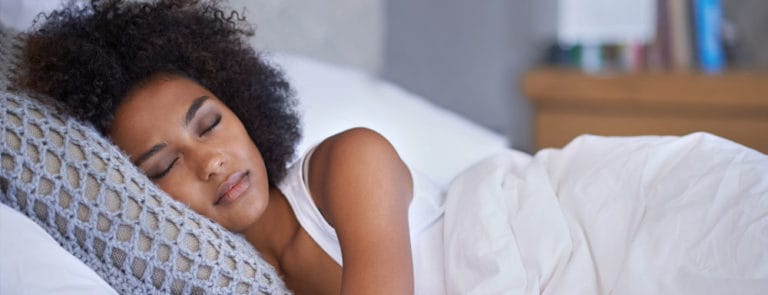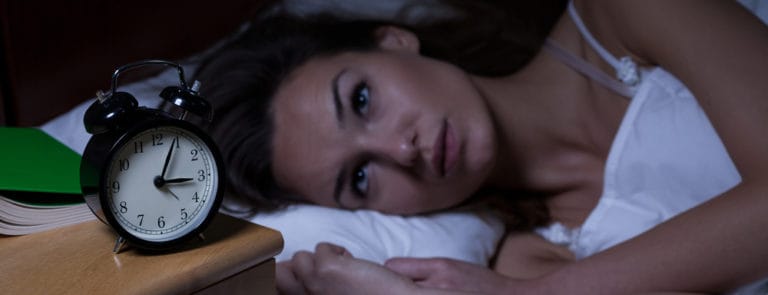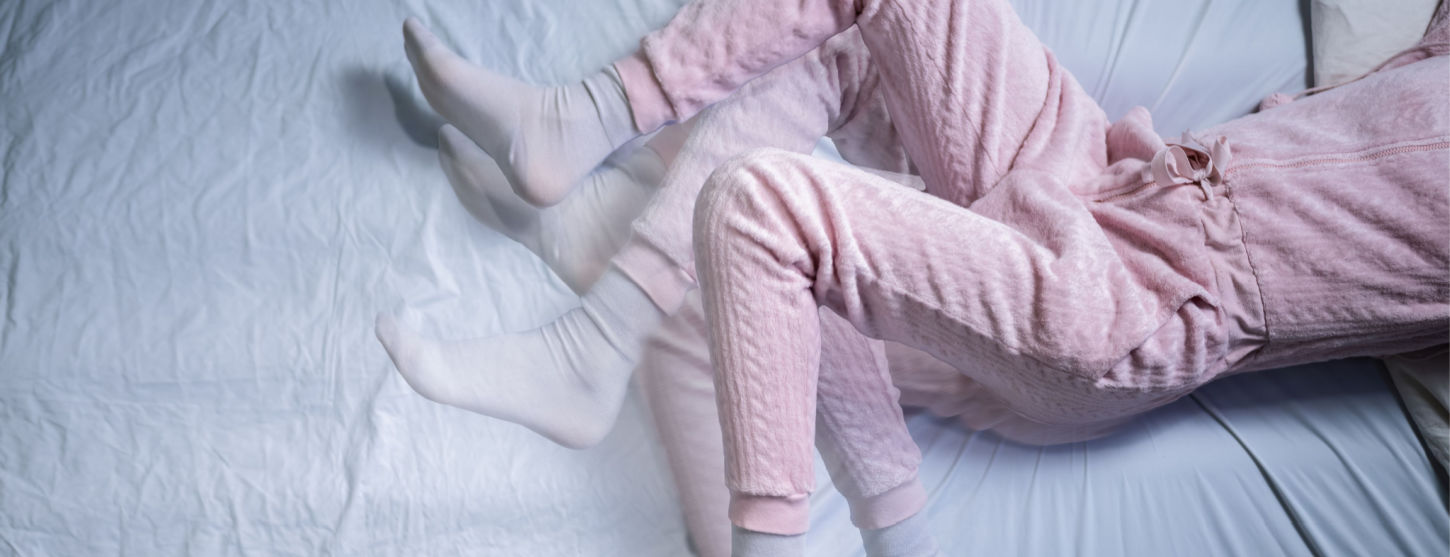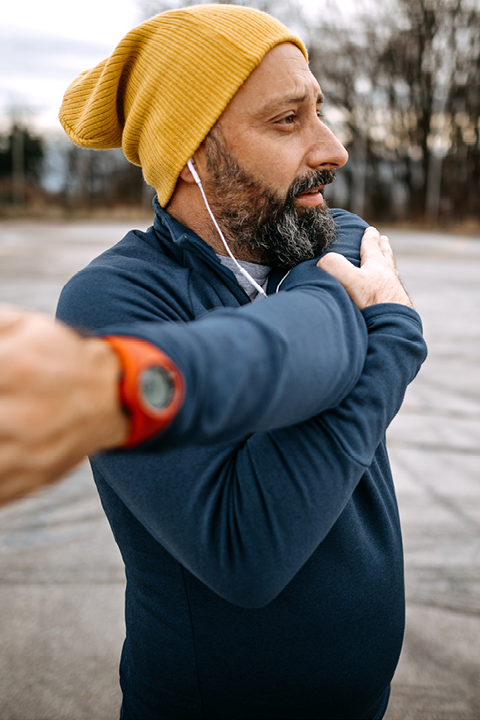10% off £25 OR 15% off £35
Guide to sleeping better – 34 natural sleeping remedies

Can’t sleep? You’re not alone.
A study into the sleep habits of our nation found that a mere 38% of us can be classified as ‘good sleepers’, whereas 30% of us experience severe sleep deprivation1 - so it’s not just you who struggles to switch off at night!
Why do we need sleep?
The thing is, we need good quality sleep to survive and thrive in all aspects of our life.
Regular high-quality sleep gives us the energy needed to tackle each and every day, as well as helping:
- promote positive mental wellbeing
- protect our immune system
- cell growth and repair
- improve our sex lives
Whereas regularly experiencing poor sleep could put you at serious risk of health conditions like obesity, heart disease, anxiety, depression, diabetes, and high blood pressure.
Poor sleep can also shorten your overall life expectancy making it very important to get those ZZZs in night after night.2
The food, drinks, and macronutrients we consume play a huge part in how well or badly we sleep.
What is your body clock?
Known as the circadian rhythm, this internal body clock is controlled by a part of the brain called the suprachiasmatic nucleus (SCN) and it’s on automatic repeat every 24 hours. It helps regulate our sleep and other functions such as our eating habits and body temperature.
Our body clock resets itself each day by using signals from external timekeepers, such as light and dark.
For example, when it gets dark at night, light-sensitive cells in our eyes send a message to our body clock causing it to inhibit the release of waking hormones cortisol and adrenaline, and increase the production of the sleep-promoting hormone melatonin.
Environmental factors like the amount of sunlight we get and blue light from the technology we use can greatly impact our body clock.
As a nation, we are now sleeping later and less than ever before. To find out exactly how and why our sleep has changed over the past 150 years, have a read of our article on the history of sleep.
Why your body clock goes wrong
Anything that upsets the 24-hour cycle, such as the clocks moving forwards or backwards, jet lag, shift work, or even just a very late night, can have a detrimental effect on our sleep patterns, which can sometimes lead to more serious sleep problems like insomnia.
Experts also blame our 24-hour society for the increase in insomnia symptoms. Rolling news, 24-hour supermarkets, internet access whenever we like – all this continual activity is only possible thanks to artificial light, but it confuses our circadian rhythms.
The result? Forcing your body to be alert and active at a time it should be asleep not only squeezes the time available for sleep, but it also triggers a stress response in the body that lowers the immune system, and puts a strain on the heart.
How many hours of sleep should we get a night?
Many factors determine how much sleep you need a night, one of them being your age.
See the table below for the average hours of sleep you should be getting per night, depending on how old you are.3
| Age range | Average hours of sleep needed per night |
|---|---|
| Babies (4-12 months old) | 12-16 |
| Toddlers (1-2 years old) | 11-14 |
| Children 3-5 years old | 10-13 |
| Children 6-12 years old | 9-12 |
| Teenagers (13-18 years old) | 8-10 |
| Adults (18-64 years old) | 7-9 |
| Older adults (65+) | 7-8 |
As you can see, younger people tend to need more hours of sleep per night to help their brains develop.
What is deep sleep?
Deep sleep is the most restorative sleep we experience. During deeper sleep stages, our bodies put energy into tissue repair and growth, as well as hormone release and energy restoration. It also helps us the most out of all the sleep cycles to feel refreshed and revived during the following day.
Most deep sleep occurs in sleep stage 3 read more about sleep cycles below.
What are the different sleep cycles?
Sleep stage 1: we experience very light sleep in this cycle and can be woken easily. It usually lasts 5-10 minutes at the start of our sleep
Sleep stage 2: our heart rates slow down and body temperature drops in this cycle. It usually lasts 20 minutes at a time and makes up around 50% of your total sleep (you have multiple cycles of this stage throughout the night)
Sleep stage 3: our muscles relax and blood pressure/breathing rates drop in this stage and we become non-responsive and very difficult to wake. This is our deepest sleep cycle and helps us transition into REM sleep.
REM sleep: Rapid Eye Movement sleep causes your body to become immobilised while your brain becomes more active, your eyes move rapidly and you have dreams – this stage can last up to an hour and around 20% of total sleep is made up of this stage.4
How to tell if you’re not getting enough sleep
Although there are guidelines for how much sleep you should be getting a night, usually dependent on your age, everyone has individual sleep needs; 7 hours of sleep may feel like plenty for you, whereas another person would feel like it’s barely scratching the surface.
Don’t worry though, your body will let you know if you’re not getting enough sleep! If you have one or more of the following signs, it’s a good indicator that you may not be getting adequate sleep:
- Trouble staying awake during the day
- Feeling annoyed/irritated a lot
- Unmotivated/lacking energy to do exercise, especially if you usually enjoy it
- Gaining weight and feeling hungry a lot
- Brain fog and lack of focus
Summary
- Only 38% of the population are classed as good sleepers
- Good sleep is essential for our physical and mental wellbeing
- Disruption to your body clock – your circadian rhythm – can lead to insomnia
- Adults need 7-9 sleep a night – more for children
What is the best natural sleeping position?
How do you like to sleep? On your stomach? On your side? Or maybe full-on starfish?
We all sleep differently. For some, this means dropping off and waking up in relatively the same position as you nodded off in. While for others, it means sleeping in lots of different positions throughout the night.
There are three main sleeping positions:
- Side
- Back
- Stomach
Sleeping on your side is reportedly the most popular sleeping position.5 It can help in the snoring stakes too because when you sleep on your side, your airways are more open than if you sleep on your back.6
So, we’ve established the most popular sleeping position. What about the best sleeping positions?
Six of the best sleeping positions
The best sleeping position for back pain
Sleep position: Sleeping on your side.7
How it helps: Drawing your legs up slightly towards your chest and putting a pillow between your legs helps take the pressure off your back.
The best sleeping position for lower back pain
Sleep position: Lying on your back.8
How it helps: Putting a small pillow behind your knees provides additional support and helps maintain the natural curve of the spine.
The best sleeping position for neck pain
Sleep position: Sleeping on your side or your back.9
How it helps: If you sleep on your back, putting a rounded pillow that supports the natural curve of your neck provides much-needed support. If you sleep on your side, put a pillow that’s higher under your neck than your head to keep your neck in alignment.
The best sleeping position for digestion
Sleep position: On your left side.
How it helps: Your digestive juices work better if you lie on your left side because of the way your stomach’s shaped. Lying on the opposite side makes food particles and stomach acids spread out, potentially into your oesophagus, which can cause discomfort.10
The best sleeping position for your face
Sleep position: On your back.
How it helps: Your face isn’t being pressed into your pillow. What’s more, if you prop your head up with an extra pillow, it can help prevent the fluids that cause puffy eyes from building up.11
The best sleeping position for breathing
Sleep position: Sleeping on your side.
How it helps: Sleeping on your side allows your airways to remain more open. Research shows that almost 70% of people with sleep apnoea (when breathing stops and starts) breathe better when they’re not sleeping on their back,12 and helping people to learn to sleep on their side can be a very effective treatment for sleep aponea.
We’ve explored why some sleeping positions are best for certain things, but which position defines your sleeping habits?
Are you a:
- Freefall sleeper – you lie on your stomach, with your head turned to one side and your arms under or wrapped around your pillow.13
- Yearner sleeper – you lie on your side with your arms stretched right out in front of your body.
- Solider sleeper – you lie on your back with your arms and legs lying flat.
- Starfish sleeper – you lie on your back with your arms up near your head.
- Log sleeper – you lie on your side with your arms down by your sides. While this happens to be one of the most uncomfortable positions to fall asleep in, it is the most common position to be asleep in.14
We don’t always sleep the same way every single night either although we do tend to have one or two sleeping positions we always seem to instinctively lie in.15
Because of all of these different variables, there isn’t an overall best sleeping position, but we can choose the best positions based on our own sleep journeys.
Sleep podcast
34 of the best natural sleep remedies
That’s why we’ve collected the best research-backed tips to help you switch off at the end of the day and get the peaceful and restorative night’s rest your body needs.
-
Enjoy a snooze-y supper
Foods containing certain hormones – and compounds that promote hormonal activity like magnesium and calcium – can have gentle sedative and sleep-inducing effects.16 Here are some foods that help you sleep:
- warm milk/soy milk
- plain yoghurt
- potatoes
- oatmeal
- bananas
- almonds
- flaxseeds
- peanut butter
- tofu
- sunflower seeds
Try eating at least one of these 4-5 hours before bedtime.
-
Relax with valerian
Valerian is a traditional herbal remedy which may help with temporary relief of sleep disturbances due to mild anxiety.
The safe and naturally relaxing root is still used today by some people who struggle to ‘switch off’ at night, so it may be worth a try!17
-
Eat breakfast by the window
Are you in the ‘scoff it down and shoot out the door’ breakfast club?
If you’re struggling to sleep, it may be time to take a slower approach in the morning and enjoy eating breakfast by the window. By doing so, you get a shot of early morning light (even if its overcast) that can help reset your body clock.
The light will help you feel more awake at the start of your day, which should, in turn, help you feel sleepy in the evening.
-
Snack yourself to sleep
Ok, so it’s not advisable to tuck into a full meal an hour before bed but having a little snack could actually help you doze off.
Go for a low-GI combo of slow-release carbs and protein to help keep your blood sugar steady so you don’t wake up. We recommend an oatcake topped with almond butter.17
-
Make sure you get enough magnesium
Magnesium is an essential mineral, which has been shown to both help people fall asleep and stay asleep for longer.18
Try taking a supplement or eating foods like tofu, spinach, almonds, avocados and dark chocolate to keep your levels up.
It is important to note that the research was tested out on elderly insomnia patients and so may not be as effective on the general population.
-
5-HTP
Our bodies make 5-HTP from foods containing the amino acid tryptophan – like turkey, eggs, salmon and seeds5– and then turns it into serotonin, a neurotransmitter that regulates mood.
If you think some of your sleep issues could be due to anxiety, e.g. racing thoughts and worries before bed, making sure you have enough 5-HTP could help you improve the quality and increase the duration of your sleep.19
The research into 5-HTP and sleep is very limited and so may not help everyone get a better night’s sleep.
-
Give caffeine a curfew
It’s a no-brainer not to neck an espresso just before you go to bed if you want to enjoy any sleep. But if you’re having trouble nodding off, you may have to extend the caffeine curfew and avoid your regular teas and coffees after 4pm.
You can still enjoy a nice cuppa – just choose decaf or switch to herbal teas.
-
Feeling sleep-tea?
Aside from decaffeinated tea, what is the best tea for sleep? Instead of your regular brew – which may be hindering your sleep – try sipping some of these herbal teas in the evening to see if they can help you nod off:
- Lemon balm tea: Part of the mint family, lemon balm tea has been used for centuries to help people de-stress and sleep. A small study found that people taking lemon balm for 15 days showed a 43% reduction in insomnia symptoms, so drinking a cup or two in the evening could help you switch off.19
- Chamomile tea: Delicate and calming, chamomile tea is a popular drink of choice when it comes to supporting sleep. This natural beauty contains an antioxidant called apigenin, which attaches itself to brain receptors that could help get you feeling sleepy.20
-
Show furry friends the door…
We know you probably don’t want to hear this but cuddling with your pets in bed could be what’s keeping you up at night. Barking, purring and paws could be disturbing your sleep more than you realised.
If possible, shut your pet out of the room (sorry puss!) or at the very least get them to sleep in their own bed on the floor. You can always have them up for cuddles in the morning!
-
Fall in love with your bedroom
When you enter your bedroom, you should feel calm and comfortable – ready to relax – not stressed about the towering pile of laundry or blinded by harsh lighting.
Try to keep your bedroom as a clean and tidy sanctuary, and invest in some warm lighting and decent curtains if you haven’t done already.
-
Time for a break
We’ve all been there: finally falling to sleep, only to wake up, notice the time on our bedside clock or phone and panic that we’re not getting enough sleep – oh the irony!
Next time you wake in the middle of the night, avoid temptation, simply roll over and pay time no mind – thus ending the worry cycle that will keep you awake. Try turning your clock around and putting your phone out of reach/sight.
-
Give a mask a go
Even the smallest ray of light emerging through the gap of your curtains can switch your body to ‘awake mode’. If you’re struggling to stay asleep through the night, try slipping on a well-fitting mask to make sure light doesn’t disturb you.
-
Stay cool
Your body naturally gets cooler when you go to sleep, which means you can get a little trick-sy!21
Instead of waiting for your body to cool down naturally, try setting your heating to switch off around an hour before bed. This way, when you get into bed, your room will be at the optimal temperature for sleep already – giving you a head start.
-
Turn off tech
It goes without saying that scrolling through Instagram tucked up in bed is perhaps not the best thing if you want a good night’s sleep.
However, Harvard University researchers recommend avoiding bright screens for around 2 – 3 hours before bed, as the blue light emitted from them may mess with your natural sleep-wake cycle and hormone production.21
-
Choose the right duvet for you
Too hot? Too cold? One leg in and one leg out? If your duvet is not keeping you at a comfortable duvet, it’s time to change it.
Consider ‘going Scandi’ and having 2 single duvets instead of 1 double duvet if you and your partner have different temperature needs.22
-
Dim the lights
Bright lighting can interfere with our body’s melatonin production – the one that signals that it’s time to sleep.23 Choose low-watt bulbs that emit a dimmer and more soothing light.
Bright days and less light in the evenings may be key to getting better sleep. This is light is the dominant environmental cue our Circadian Rhythms uses to help decide whether it’s time to sleep or wake up.
However, modern life and new technology can make it a little more confusing. Here’s some tips to help keep it in sync.24
During the day
Getting enough sunlight or bright light during the day helps keep your circadian rhythm healthy – improving daytime energy as well as night-time sleep quality and duration. Here’s what to do:
- Try to get some sunlight in the morning, as close to the time you get up as possible. Even if it’s through the window.
- Spend more time outside in the daylight – even if it’s just walks at lunchtime or walking your dog in the morning instead of the evening.
- Let in as much natural light as possible into your home/workspace. Try moving your desk closer to the window and keep curtains and blinds open in the day.
- Light boxes and other light therapies are also a popular way to get more ‘sunshine’ and help support your circadian rhythm25 – even if it is man-made
At night
Turn the brightness down at night to let your body know it’s time for bed.
- Avoid looking at bright screens 1-2 hour before you go to bed. TVs, computers, phones and tablets can all stimulate your brain and their bright lights may trick them into thinking it’s still daytime. Try turning the brightness down on phones / eBooks, etc if you really can’t resist.
- Make sure the room you sleep in is dark. Consider heavy curtains or sleep masks if you are having trouble sleeping.
- Keep lights off or low if you wake up in the night to go to the toilet, use a small torch if necessary.
-
Invest in indulgent bed linen
If you have the means to do so, choose a high-quality bed linen made of natural fibres like cotton. These fabrics help to keep you cool and comfortable all night long.
-
Try a weighted blanket
The jury is out there on weighted blankets and their ability to help you sleep and reduce anxiety, but they may be worth a shot!
Typically, weighted blankets are filled with beads or pellets, weighing from 3 – 20 lbs, and claim to help you calm down at bedtime.
They’ve been used for years to help children with autism and behavioural disturbances, so if you think you lack of sleep could be psychological, maybe they could work for you.26
-
Go old-school
Using a classic alarm clock like the one your grandad has on his bedside table – y’know the standard clock faces with bells on top – could improve the quality of your sleep.
These simple yet effective clocks don’t buzz every time you get a like on your Facebook photo or light up the room when you get a text – they just wake you up when you tell them too – simple!
If you find yourself waking up through the night and checking the time, try turning your clock around to ensure an undisturbed night of rest.
-
Freeze your pillowcases
However mad it may make you feel, sticking your pillowcase in the freezer on warmer nights for around an hour could help bring your body temperature down and help you nod off.
-
Show some gratitude
Taking some time every evening to write down all the things in life you are grateful for can help you feel less anxious, boost your mood and even help you sleep better. It’s a no-brainer really. Try it and see if it works for you.
-
Crank up the classical
You may prefer EDM to Bach on the weekends, but when it comes to bedtime, classical music may be slightly more appropriate.
The soothing sounds of classical (or other relaxing sleep music) can help your mind and muscles relax, ready for a peaceful night’s sleep.
-
Less snoring, more snoozing
Got a partner snoring in your ear every night? It’s no wonder you struggle to sleep!
A YouGov survey revealed that 52% of people share a bed with a snorer- and all that noise can certainly contribute to a poor night’s sleep.27
The solution: get yourself some noise-reducing earplugs – you’ll thank us later.
-
Get moving in the morning
Although it may seem counter-intuitive to drag yourself from your bed to improve your sleeping, getting up to go workout in the morning is proven to help you sleep.
American researchers found that women who were active for 45 minutes in the morning slept better than those who waited to work out in the evening.28
Bit of motivation to get you out of bed in the morning!
-
Under pressure? Try acupressure
Research has found that acupressure can significantly improve the quality of sleep in populations with insomnia.29
Simply massaging the HT7 point that’s linked to insomnia could help you sleep better – clever, eh!
-
Bring your ‘wine o’clock’ forward
Before you worry, we’re not advising you to ditch the vino! If you like a glass of wine in the evening, enjoy a glass or two a few hours before you begin your bedtime routine so that the effects will have worn off before you go to bed.
This is advised because alcohol can disturb deep sleep patterns, one of the most restorative stages in our sleep cycle and may affect your sleep quality.
-
Be more mindful – mindfulness meditation for sleep
Mindfulness is the act of focussing on your breathing to help being your attention to the present – not leaving it to dwell on the past or worry about the future.
Several studies have shown that learning mindfulness techniques can dramatically improve sleep quality.30
Try focussing on your breathing and being present throughout the day and before bed to see if this type of sleep meditation can help you.
-
Focus on your breath
Breathing with intention could help calm your body and prep it for sleep. Dr Andrew Weil, a holistic expert, promotes the 4-7-8 breathing technique to help you fall asleep.
Here’s how to do it:31
- Rest the tip of your tongue just behind your upper teeth and make a ‘whoosh; sound by exhaling through your mouth
- Close your mouth and breathe in for 4 seconds through your nose
- Exhale through your mouth for 7 seconds
- Repeat until you fall asleep
-
Sniff some lavender
One of the best essential oils for sleep, lavender is a long-standing sleep remedy – and perhaps proof you should listen to your granny!
A recent review of studies shows a positive link between inhaling lavender and the improvement of sleep quality.33
Try popping some lavender oil in a diffuser or spraying some lavender sleep spray on your pillow before bed.
-
Don’t sleep on a full – or empty – stomach
When you eat a heavy meal late at night, your body will be more concerned about digesting your food as you sleep, rather than working on rest and repair.
It is much harder for your body to do this when you’re awake, so try and avoid sleeping on a full stomach.
If you get peckish before bed, opt for a healthy light snack and foods to help you sleep like fruit or a small bowl of low-sugar cereal.
-
Consider supplements for better sleep
Sometimes our diets may be lacking in certain vitamins and minerals that can help us maintain healthy sleep routines. Taking these micronutrients in supplement form may help your body to wind down and sleep better.
Minerals and vitamins for more sleep
- Vitamin D: having a vitamin D deficiency is associated with a higher risk of sleep disorders34
- Calcium: this mineral helps our bodies to use the amino acid tryptophan to produce melatonin – which helps us to sleep35
- B vitamins: maintaining healthy levels of B vitamins like B3, B5, B6, B9 and B12 can also help your body to produce tryptophan. It’s well known that B vitamins play an important role in supporting our nervous system. Vitamin B6 benefits the body by converting the amino acid tryptophan into serotonin, a neurotransmitter that helps regulate levels of the sleep hormone melatonin.35 Research by the University of Adelaide in 2018 supports a link between B6 and a good night’s rest; those who took a supplement before bed reported better quality of sleep and feeling more refreshed on waking.36 The fact that the vitamin also appears to ease anxiety and irritability in women with premenstrual syndrome further suggests a calming effect on the body.37
- Magnesium: magnesium can help you sleep by helping you to relax before bed
-
Write down any worries
Bouts of anxiety are normal, especially when all goes quiet at bedtime and we no longer have distractions from our own mind.
You can almost guarantee those past embarrassing moments like when you fell flat on your face in front of your date will rear their ugly heads. Perhaps not the best things to be running through your mind before bed!
Events like interviews or dinner with the in-laws can keep you up too. If this happens to your regularly, try to set aside some time before bed to make a list of anything that’s bothering you or you need to remember for the morning after.
If your mind is still whirring after this, resist the urge to pick up your phone and try to focus on something abstract instead, like the journey to school when you were younger, did you walk? Get driven? What sites/landmarks did you pass? Which door did you use to enter the school?
Focussing on something familiar and requiring low-level concentration like this may help you to fall asleep.
-
Create a sanctuary for sleep
Where you sleep can have a big impact on the quality and duration of your slumber. Keeping your bedroom dark, cool and quiet can help you on your way to better sleep:
Dark: having a bright pink bedroom may seem like the best idea at the time, but it’s not the most soothing of colours to send your mind adrift.
Make sure you paint your room in soft and mellow colours to help calm your mind.
Once the lights are off, black-out blinds, curtains and covering up bright electronics can help too.
Cool: you know what it is like when you’re on holiday and the aircon breaks or when the temperatures sizzle at home – nodding off to sleep can feel tough.
Try to maintain a temperature of 70°F (20°C) all year round for restful sleep.
Quiet: however tempting it is, try not to fall asleep to podcasts or TV as they could wake you up further into the night.
Instead, try to keep your sleeping environment as quiet as possible.
If you have noisy neighbours, a loud boiler, or any other noise keeping you up at night, it might be time to invest in some foam earplugs!
-
Get back in touch with your natural cycle
Before any morning alarms, bedtimes or clocks of any sort were set, us humans relied on the natural sleep system in our bodies to dictate our when and how much we slept.
Known as our circadian rhythm or natural sleep-wake cycle, this process in which our bodies release different hormones to make us wake up, get tired and eventually fall asleep again at night.
Getting in sync with it can help regulate when and how long we sleep for – and it’s our own bodies that have decided on those values, so we can trust we are getting what we need.
Here’s some tips on how to tune-in to your natural sleep-wake cycle:
- Go to sleep and get up at the same time every day. Choose a bedtime when you normally feel tired and waking up naturally. If you still need an alarm clock to get you up in time, you may need an earlier bedtime.
- Avoid oversleeping. Even on weekends after a late night, you should try and get up at a similar time as you usually do. Daytime napping can help and is still better than disturbing your natural sleep-wake pattern.
- Nap smartly. Napping feels good and is a great way to make up for lost sleep, however, you need to be smart about it. If you have trouble sleeping, napping can make it worse. Try to limit your naps to 20 minutes and take them no later than early afternoon – taking your disco naps early will still give you that boost before heading out!
- Fight after-dinner fatigue. It is easy to snooze off after dinner, especially if it’s your biggest meal of the day. A much better idea is to get up and do some mild activity like planning your outfit for the next day, washing up or calling a friend. This way, your after-dinner drowsiness is less likely to affect your natural sleep-wake cycle.
Studies have found that ‘short sleepers’ and ‘long sleepers’ are at increased risk for all-cause mortality compared to individuals who report a ‘medium’ amount of sleep per night (7-7.9h on average) – so it’s important to get the balance right!38
Summary
Our 34 top tips for a better night’s sleep include:
- Eat foods that help you sleep
- Relax with valerian
- Eat breakfast by the window
- Snack yourself to sleep
- Make sure you get enough magnesium
- Increase your intake of 5-HTP
- Give caffeine a curfew
- Show furry friends the door
- Try a sleep tea
- Fall in love with your bedroom
- Don’t obsess with the time if you wake in the night
- Try a sleep mask
- Stay cool
- Turn off tech
- Choose the right duvet
- Dim the lights
- Invest in indulgent bed linen
- Try a weighted blanket
- Use a classic alarm clock
- Freeze your pillowcases
- Keep a gratitude diary
- Listen to classical music
- Cut out the snoring
- Get moving in the morning
- Try acupressure
- Bring your ‘wine o’clock’ forward
- Try mindfulness meditation for sleep
- Focus on your breathing
- Sniff some lavender
- Don’t sleep on a full – or empty – stomach
- Consider supplements for better sleep
- Write down your worries
- Create a sanctuary for sleep
- Get back in touch with your natural cycle
Last updated: 28 September 2022
- Morphy H, Dunn KM, Lewis M, Boardman HF, Croft PR. Epidemiology of insomnia: a longitudinal study in a UK population. Sleep. 2007 Mar;30(3):274-80. PMID: 17425223.
- https://www.nhs.uk/live-well/sleep-and-tiredness/why-lack-of-sleep-is-bad-for-your-health/
- https://www.nhs.uk/live-well/sleep-and-tiredness/how-much-sleep-do-kids-need/
- https://www.nlg.nhs.uk/content/uploads/2019/06/Sequences-of-sleep.pdf
- https://www.onhealth.com/content/1/best_sleeping_positions_sleep
- https://www.snorelab.com/sleeping-position-and-snoring/
- https://www.healthline.com/health/healthy-sleep/best-sleeping-position-for-lower-back-pain#pillow-between-your-knees
- https://www.healthline.com/health/healthy-sleep/best-sleeping-position-for-lower-back-pain
- https://www.sleepfoundation.org/sleeping-positions/best-sleeping-position-for-neck-pain
- https://www.medicalnewstoday.com/articles/best-side-to-sleep-on-for-digestion
- https://www.southernliving.com/fashion-beauty/beauty-makeup/best-sleeping-position
- https://www.sleepfoundation.org/sleeping-positions
- Ravesloot, M. J., van Maanen, J. P., Dun, L., & de Vries, N. (2013). The undervalued potential of positional therapy in position-dependent snoring and obstructive sleep apnea-a review of the literature. Sleep & breathing = Schlaf & Atmung, 17(1), 39–49. https://doi.org/10.1007/s11325-012-0683-5
- https://www.sleepfoundation.org/sleeping-positions/meaning
- https://www.ncbi.nlm.nih.gov/pmc/articles/PMC1119282/
- https://pubmed.ncbi.nlm.nih.gov/6764927/
- https://www.sleepfoundation.org/nutrition/healthy-bedtime-snacks
- https://www.sciencedirect.com/science/article/pii/B9780124201682000314
- Jenkins TA, Nguyen JC, Polglaze KE, Bertrand PP. Influence of Tryptophan and Serotonin on Mood and Cognition with a Possible Role of the Gut-Brain Axis. Nutrients. 2016 Jan 20;8(1):56. doi: 10.3390/nu8010056. PMID: 26805875; PMCID: PMC4728667.
- https://www.ncbi.nlm.nih.gov/pmc/articles/PMC3230760/
- https://www.ncbi.nlm.nih.gov/pmc/articles/PMC2995283/
- https://www.ncbi.nlm.nih.gov/pmc/articles/PMC3427038/
- https://www.health.harvard.edu/staying-healthy/blue-light-has-a-dark-side
- https://www.mattressadvisor.com/scandinavian-trick-help-sleep-better/
- https://www.health.harvard.edu/staying-healthy/blue-light-has-a-dark-side
- https://www.sleephealthjournal.org/article/S2352-7218(18)30173-6/abstract
- https://yougov.co.uk/topics/society/articles-reports/2011/09/29/does-your-partner-snore
- https://yougov.co.uk/topics/lifestyle/articles-reports/2011/09/29/does-your-partner-snore
- https://pubmed.ncbi.nlm.nih.gov/14655916/
- https://pubmed.ncbi.nlm.nih.gov/20056221/
- https://www.health.harvard.edu/blog/mindfulness-meditation-helps-fight-insomnia-improves-sleep-201502187726
- https://www.drweil.com/health-wellness/body-mind-spirit/stress-anxiety/breathing-three-exercises/
- https://www.fht.org.uk/system/files/field/article-files/research_lavender_sleep.pdf
- Allen RP, Earley CJ. The role of iron in restless legs syndrome. Mov Disord. 2007;22 Suppl 18:S440-8. doi: 10.1002/mds.21607. Erratum in: Mov Disord. 2008 Jun;23(8):1200-2. PMID: 17566122.
- Barbosa R, Scialfa JH, Terra IM, Cipolla-Neto J, Simonneaux V, Afeche SC. Tryptophan hydroxylase is modulated by L-type calcium channels in the rat pineal gland. Life Sci. 2008 Feb 27;82(9-10):529-35. doi: 10.1016/j.lfs.2007.12.011. Epub 2007 Dec 23. PMID: 18221757.
- http://journals.sagepub.com/doi/full/10.1177/0031512518770326
- http://ebm.bmj.com/content/4/6/182













